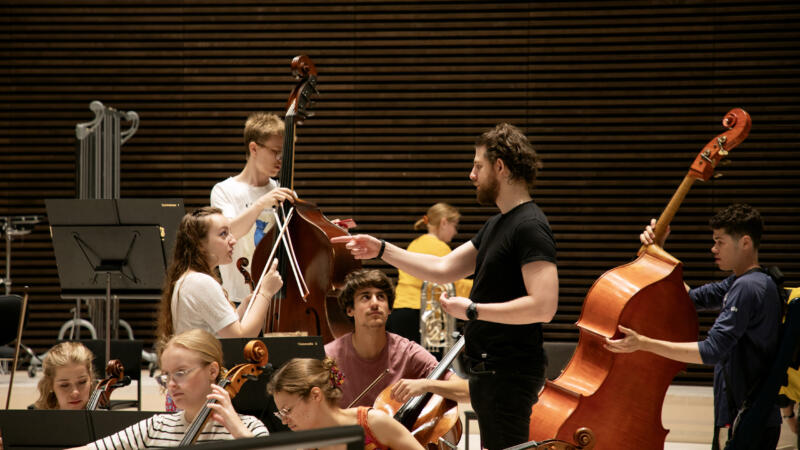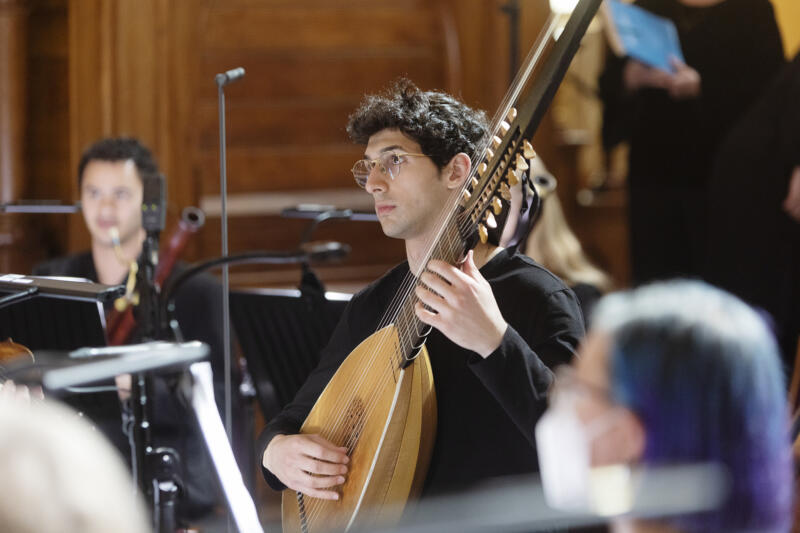Voice and Justice – Music as a Facilitator of Diversity
This international project explores how music-making and research support intercultural dialogue and social equality.
Introduction
The four-year project aims to:
- highlight the role of music as a unifying force in society through collaboration, artistic creation, experience, and research.
- address the growing need to promote intercultural dialogue within Finnish music education and society.
- foster interaction and discussions on societal themes through the means of music.
- investigate how music can serve as a tool in culturally sensitive issues and as a safe space for opening difficult societal conversations.
- deepen the understanding of the role of music, its traditions, and performances in building cultural dialogue.
- introduce new ways of encountering diversity and different cultures in Finnish music education.
For students, the project provides an opportunity to develop themselves and gain experience in working in multicultural environments. Participation in these projects requires open-mindedness as well as a willingness to expand artistic thinking, to experiment with new approaches, and to develop collaborative practices
Artistic collaborative projects
The Sibelius Academy, in partnership with American collaborators, will carry out four artistic collaborative projects.
Mission Music
This project focuses on music played on Latin American and Californian mission stations, specifically music performed in the native languages of the regions from the late 1500s to the 1600s. During the project, the team will explore how the dialectics of Indigenous languages were presented and preserved on these mission stations.
The project leaders are Adam Knight Gilbert, director of the Musicology Program at USC Thornton, and Rotem Gilbert, associate dean for research. Five students from the Sibelius Academy, as well as Annamari Pölhö, the head and lecturer of the Early Music Department, will participate in the project. The project will take place in spring 2025.
Watch the concert recording: USC Thornton Baroque Sinfonia – A. Falconiero – Passacalle
Third Spaces – An Intercultural Dialogue
Third Spaces is a ten-day residency program held twice a year in Santa Fe, New Mexico, USA. This initiative gathers musicians and artists from diverse cultural backgrounds to explore possibilities for intercultural artistic collaboration. The aim is to establish long-term cooperation, particularly with Indigenous communities in the Santa Fe area. Participants include representatives from the Sibelius Academy’s Global Music programme and local artists from Santa Fe. The project will take place in 2026.
Where Music Resides
This project is a collaboration between the Sibelius Academy’s Jazz Music programme and the Jazz Department of DePaul University in Chicago. It aims to develop a more inclusive approach to jazz education that better recognizes diversity and reaches out to multicultural communities. The collaboration is strongly tied to the development of education and curriculum design.
The project will deepen understanding of how the meanings of music live within surrounding cultures and how music impacts people’s lives and society as part of ongoing changes. Eight students (four from each institution) and three teachers—two from the Sibelius Academy and one from DePaul University—will participate in this project. The project will take place in spring 2026.
Echoes Unheard
In this project, the Sibelius Academy and USC Thornton will jointly create two new chamber opera world premieres. Both operas will feature 6–9 opera students, and the orchestras will be composed of 8–10 musicians in a chamber ensemble. The aim is to involve actors and/or dancers as well.
USC Thornton, as a partner, is further along in recognizing and addressing systemic racism and the discrimination faced by historically marginalized peoples and groups. Through this opera project, the Sibelius Academy will gain both experience and practical methods for diversifying opera productions and highlighting silenced voices. The project will take place in 2026.
Research project: Investigating the Role of Music in Facilitating Dialogue and Promoting Cultural Understanding
This four-year research project examines how music can bring together different cultural backgrounds, resolve conflicts, strengthen cultural diversity, and promote intercultural understanding and dialogue. The goal is to identify best practices where music has been used to address differences and conflicts. The research will also develop methods for using music to address challenges in Finnish society, such as immigration, multiculturalism, and the concept of otherness.
The project will involve four representatives from the Sibelius Academy’s Arts Management Programme at Uniarts Helsinki—two doctoral students and two teachers. The final outcome
will be the creation of an online resource to support teachers and institutions in integrating intercultural dialogue into their teaching, material choices, and performances.
Visiting experts and professors
During the project, the Sibelius Academy will invite six international visiting professors and experts, who specialise in topics such as the role of the arts in intercultural dialogue, music history, cultural diversity, cultural heritage, or the history of various human groups and their Indigenous arts. Each guest will work with students on a project basis for one year (2–5 visits per year).
The teaching visits will complement, deepen, and diversify the results of the projects carried out in the initiative. Through the concept of “domestic internationalisation,” they offer all Sibelius Academy students and staff the opportunity to engage with the learning experiences and outcomes of the project.
Contact person regarding this project
-
Kaisa Johansson
- Specialist, Development services Sibelius Academy, Sibelius Academy
- +358407104203
- kaisa.johansson@uniarts.fi
Read news about the project
Project name
Ääni ja oikeus: Musiikki monimuotoisuuden edistäjänä
Time
01/2025-12/2027
Funder
Jane and Aatos Erkko Foundation
Collaborators
Contact
Osahankekohtaiset vastuuhenkilöt
- Mission Music: Annamari Pölhö (annamari.polho@uniarts.fi)
- Third spaces – an intercultural dialogue: Nathan Thomson (nathan.riki.thomson@uniarts.fi)
- Where music resides: Sami Linna (sami.linna@uniarts.fi)
- Echoes unheard: Markus Lehtinen (markus.lehtinen@uniarts.fI) ja Tero Valtonen (tero.valtonen@uniarts.fi)
- Investigating the role of music in facilitating dialogue and promoting cultural understanding: Violeta Simjanovska
Introduction
The four-year project aims to:
- highlight the role of music as a unifying force in society through collaboration, artistic creation, experience, and research.
- address the growing need to promote intercultural dialogue within Finnish music education and society.
- foster interaction and discussions on societal themes through the means of music.
- investigate how music can serve as a tool in culturally sensitive issues and as a safe space for opening difficult societal conversations.
- deepen the understanding of the role of music, its traditions, and performances in building cultural dialogue.
- introduce new ways of encountering diversity and different cultures in Finnish music education.
For students, the project provides an opportunity to develop themselves and gain experience in working in multicultural environments. Participation in these projects requires open-mindedness as well as a willingness to expand artistic thinking, to experiment with new approaches, and to develop collaborative practices
Artistic collaborative projects
The Sibelius Academy, in partnership with American collaborators, will carry out four artistic collaborative projects.
Mission Music
This project focuses on music played on Latin American and Californian mission stations, specifically music performed in the native languages of the regions from the late 1500s to the 1600s. During the project, the team will explore how the dialectics of Indigenous languages were presented and preserved on these mission stations.
The project leaders are Adam Knight Gilbert, director of the Musicology Program at USC Thornton, and Rotem Gilbert, associate dean for research. Five students from the Sibelius Academy, as well as Annamari Pölhö, the head and lecturer of the Early Music Department, will participate in the project. The project will take place in spring 2025.
Watch the concert recording: USC Thornton Baroque Sinfonia – A. Falconiero – Passacalle
Third Spaces – An Intercultural Dialogue
Third Spaces is a ten-day residency program held twice a year in Santa Fe, New Mexico, USA. This initiative gathers musicians and artists from diverse cultural backgrounds to explore possibilities for intercultural artistic collaboration. The aim is to establish long-term cooperation, particularly with Indigenous communities in the Santa Fe area. Participants include representatives from the Sibelius Academy’s Global Music programme and local artists from Santa Fe. The project will take place in 2026.
Where Music Resides
This project is a collaboration between the Sibelius Academy’s Jazz Music programme and the Jazz Department of DePaul University in Chicago. It aims to develop a more inclusive approach to jazz education that better recognizes diversity and reaches out to multicultural communities. The collaboration is strongly tied to the development of education and curriculum design.
The project will deepen understanding of how the meanings of music live within surrounding cultures and how music impacts people’s lives and society as part of ongoing changes. Eight students (four from each institution) and three teachers—two from the Sibelius Academy and one from DePaul University—will participate in this project. The project will take place in spring 2026.
Echoes Unheard
In this project, the Sibelius Academy and USC Thornton will jointly create two new chamber opera world premieres. Both operas will feature 6–9 opera students, and the orchestras will be composed of 8–10 musicians in a chamber ensemble. The aim is to involve actors and/or dancers as well.
USC Thornton, as a partner, is further along in recognizing and addressing systemic racism and the discrimination faced by historically marginalized peoples and groups. Through this opera project, the Sibelius Academy will gain both experience and practical methods for diversifying opera productions and highlighting silenced voices. The project will take place in 2026.
Research project: Investigating the Role of Music in Facilitating Dialogue and Promoting Cultural Understanding
This four-year research project examines how music can bring together different cultural backgrounds, resolve conflicts, strengthen cultural diversity, and promote intercultural understanding and dialogue. The goal is to identify best practices where music has been used to address differences and conflicts. The research will also develop methods for using music to address challenges in Finnish society, such as immigration, multiculturalism, and the concept of otherness.
The project will involve four representatives from the Sibelius Academy’s Arts Management Programme at Uniarts Helsinki—two doctoral students and two teachers. The final outcome
will be the creation of an online resource to support teachers and institutions in integrating intercultural dialogue into their teaching, material choices, and performances.
Visiting experts and professors
During the project, the Sibelius Academy will invite six international visiting professors and experts, who specialise in topics such as the role of the arts in intercultural dialogue, music history, cultural diversity, cultural heritage, or the history of various human groups and their Indigenous arts. Each guest will work with students on a project basis for one year (2–5 visits per year).
The teaching visits will complement, deepen, and diversify the results of the projects carried out in the initiative. Through the concept of “domestic internationalisation,” they offer all Sibelius Academy students and staff the opportunity to engage with the learning experiences and outcomes of the project.
Contact person regarding this project
-
Kaisa Johansson
- Specialist, Development services Sibelius Academy, Sibelius Academy
- +358407104203
- kaisa.johansson@uniarts.fi

